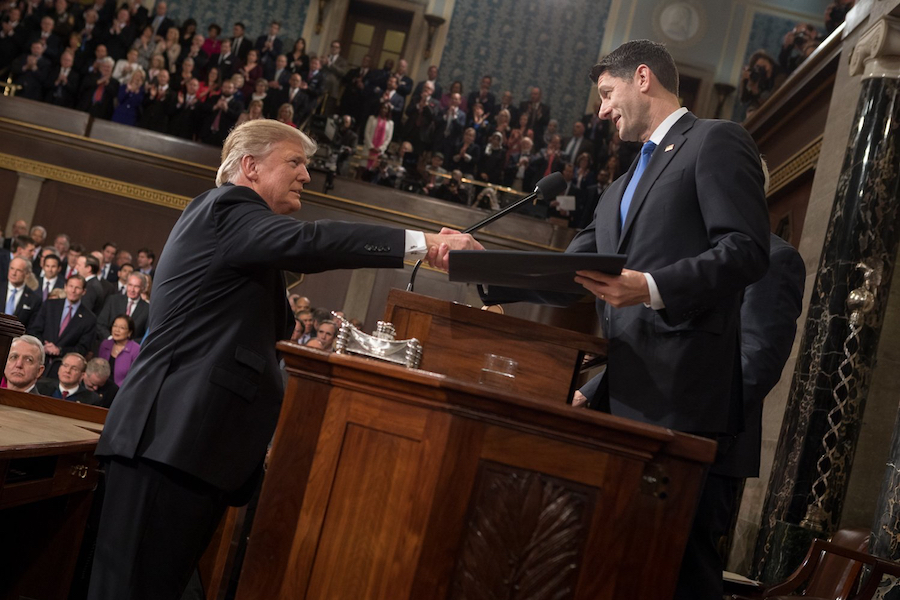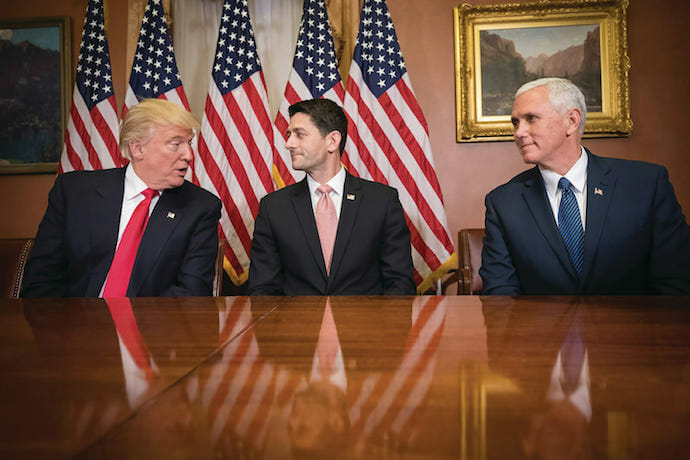
Politics
Trump, Healthcare Reform and the Limits of Dominance Politics
If you’ve been paying attention, it should not have come as a surprise Thursday night when, rather than bend to the demands of the unbending far-right Freedom Caucus who refuse to support the American Health Care Act, Trump instead has decided to spurn the traditional wound-licking strategy that typically happens when a legislative push fails. Nor should it come as a shock that rather than bow to this reality, Trump is attempting to turn the tables back on the caucus by forcing a floor vote and daring them to vote against (what he has decided to call) repeal of Obamacare.
I didn’t coin the term, but I think “dominance politics” is a great way of phrasing what has come to be Trump’s core political philosophy and the tactics he has employed to great success in his political and business career.
In my opinion, one of the best windows into how Trump thinks and views the world continues to be found in his Trump University sales playbook. I covered the details of this playbook during the presidential campaign over the course of several stories.
The manual, as well as revelations made during the two major fraud lawsuits brought against him by former customers, made two things abundantly clear: first, that Trump had zero compunction about saying or promising whatever he needed to in order to get his mark to sign on the dotted line. Secondly, he was unusually obsessed with displays of dominance and using a combination of domination and disinformation to unnerve and unsettle his prey. Questions about how his products worked, their cost or financial limitations were treated in the playbook as hostile and unwelcome obstacles to be deflected and neutralized through a series of answers that “take back the power” (direct quote) in the conversation.
Even Trump’s political allies are not immune to this philosophy, as Chris Christie, Mike Pence, Ted Cruz, Paul Ryan, Mitt Romney and others can attest. In fact, it might be accurate to say that Trump believes it is more important that he dominate his allies and underlings than his enemies. He’s the boss, he calls the shots. In Trump World, if you are not dominating, you are being dominated, or at the very least leaving yourself open to being dominated.
As I said, this has worked remarkably well for Trump thus far. It has made him rich and got him to the White House, and thus shouldn’t be underestimated. But there are limits to this form of dominance politics, and we are about to see one of the first major tests of how effective it is spurring action in a government designed to breed consensus and cooperation.

For context: the President is unpopular, historically so this early in a new administration. In some cases, that alone would be a death sentence to his power and reach, but the group of Americans that Trump is most popular and influential with also happens to be running Congress, and thus there is an intense incentive pushing all sides to work together and take advantage of a united Republican government.
Secondly, the AHCA is extremely unpopular, with conservatives, liberals and moderates. At this point I am not sure what would actually be worse for the Republicans: if they fail to pass a bill at all or if they succeed and go into the 2018 elections carrying the weight of a law that is more unpopular than the ACA that swept them into power in 2010. That is what happens when you spend 8 years deriding a Heritage Foundation-inspired, Republican health care plan that bends over backward to prop up the private insurance market as “socialized medicine.”
As a result, the Republicans have thoroughly boxed themselves in, having spent four straight election cycles loudly and hysterically promising to burn Obamacare to the ground and are now completely unwilling to deal with the actual real world consequences of that absolutist position now that they’ve been handed total power. Along the way, they have elected a generation of congressional bomb throwers in 2010 and 2014 who cannot distinguish between Paul Ryan corporate conservatism and Bernie Sanders-style socialism. To them there is the hard right “freedom option” and everything else represents “tyranny.” Great posture if you are opposing an agenda. Not so great when it comes to leading and pushing one through Congress.
Anyone who looks at the history of health care reform since the New Deal will see a familiar ominous pattern. The short version: every attempt at major reform regardless of party, is met with intense resistance from the insurance industry, hospital lobbyists and conservative elements. In nearly every case, it either goes down in flames, or passes and spurns a counterrevolutionary political movement that plagues the party who passed it for decades.
As unpopular as the AHCA is, failing to pass anything at all could be potentially even more devastating politically for the GOP, as depressed turnout is the one thing that they cannot afford while implementing a highly partisan legislative strategy. Trump’s decision to force a vote is meant as a threat, to put each and every Republican member of the House on record as being responsible for pissing away their one and only chance to “overturn” the ACA. Also implicit in this threat is that Trump will be taking names to blame and campaign against in the 2018 primaries and beyond.
Will it work? I don’t know. It looks very unlikely, but the Republicans have NEVER had this much pressure on them to get something passed, and thus far every time Trump has challenged the keepers of the old conservative order, they have blinked first and then backed down.
It’s clear that Trump’s brand of dominance politics is about to face its biggest test yet. It’s incredible to think that a president’s political capital could diminish this much less than 3 months after being elected, to the point where his own party is prepared to spurn him on a major piece of legislation that everyone campaigned on. Based on nothing more, I find it hard to believe that basic political self-interest won’t kick in at some point and compel all parties to come together, pass something and call it repeal. But “incredible” has been the new normal in politics the past year and a half, and a successful run in the House still faces huge hurdles in the Senate (where Republican Senators have to run in statewide elections instead of safely gerrymandered conservative House districts).
And if they do manage to pass it? Well, they will have successfully repeated the same political exercise the Democrats went through in 1993 and 2009, right before a wave election fatally crippled their agenda. Given that low support the plan has from even conservatives, saying no to the guy who has been dominating you the past year and a half might not seem so unappealing.

